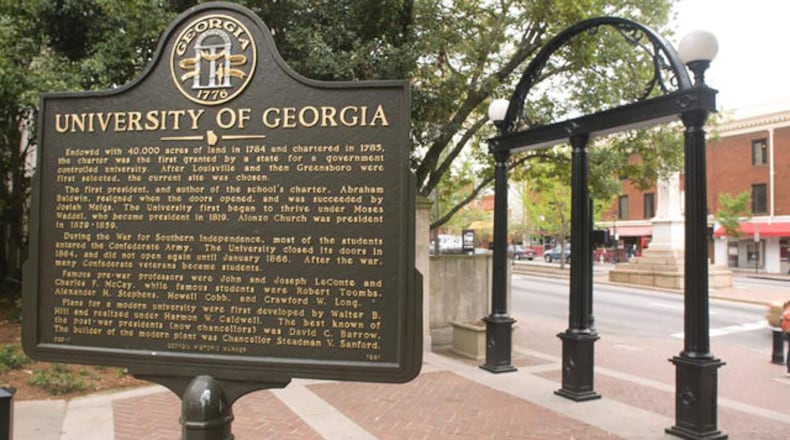It's hard to argue with the contention that the primary focus of Georgia public colleges ought to be Georgia students.
A bill called the "Keep Georgia Kids First Act" would make that official by requiring research campuses, including the University of Georgia and Georgia Tech, ensure that at least 90% of their early action admissions are offered to Georgia residents.
In explaining Senate Bill 282, sponsor Sen. Brandon Beach, R-Alpharetta, said he's not advocating for lower standards or pushing UGA and Tech to expand to Ohio State size.
"It's hard to get in Georgia and Georgia Tech. What I am asking on this bill is that we really look at how we can keep our kids here. We are sending too many kids to Alabama, Auburn, University of South Carolina, Clemson and so on," said Beach.
And many of those students meet the criteria for our own public colleges even though they were denied, he said, citing a young woman for whom he wrote a letter of recommendation who boasted a 4.0 GPA and high test scores.
"She did not get into UGA, which was her first choice," said Beach. "It is a shame we are not taking our own 4.0 GPA, 1425 SAT and 33 ACT students over kids from out of state.
While Beach said his bill "is about hardworking Georgia families and their hardworking kids," it's also about anecdotal evidence.
The reality is that UGA and Tech already give a sizable edge to in-state applicants over those from outside Georgia. As a result, the out-of-state pool of kids faces far higher selectivity standards. High school students from Georgia are not losing seats to similarly positioned out-of-state students but to ones with superior records.
Beach said he gets frequent calls from constituents disappointed their teens weren't admitted to UGA or Tech. I get some of those same calls from AJC readers.
A parent's glowing summation of their child's record may overlook critical factors about why the student failed to earn admission, especially in early decision where it's a numbers game. Rather than a holistic review of the student's high school years as occurs in regular admissions, early admission depends on the academic data.
For example, a parent-reported 4.0 GPA is often based on all the courses a student took including electives, not just the core courses the colleges consider.
Also, when you look deeper, you can discover the students bypassed the most demanding academic tracks at their high schools, often because they were involved in clubs and sports. This can hurt a student because UGA and Tech prefer applicants who took the most challenging courses their high schools offered, whether AP or International Baccalaureate.
The UGA and Tech presidents and the chancellor of the University System of Georgia testified against the bill, ticking off a list of negatives including the millions that would be lost in higher out-of-state tuition and the resulting greater demand on HOPE Scholarship and state funding.
Beach's bill is more consequential to Georgia Tech than UGA. About 60% of Tech students hail from Georgia. At UGA, 88% of undergraduates are from the state.
That 88% represents a much higher local presence than at other flagships, said UGA President Jere Morehead, citing the 39% in-state enrollment at the University of Alabama, 62% at the University of South Carolina and 64% at Auburn.
Morehead said those 12% non-Georgia students enrich the Athens campus. "The much smaller number of exemplary out-of-state students we enroll truly add significant value to UGA and to the state of Georgia as a whole," said Morehead.
Georgia Tech President Ángel Cabrera -- an out-of-state student himself when he enrolled at Tech -- said it was critical to Georgia's economy that Tech draw top talent from across the globe to drive innovation.
He credited Tech with transforming midtown Atlanta and for luring new companies to Georgia in search of “the extraordinary talent out of Tech and the other leading universities across the state."
"Many of our out-of-state students stay in Georgia and contribute to our economy," said Cabrera. "When you consider the average starting salary of one of our graduates is now around $74,000, the economic impact of our out-of-state graduates is significant."
The rising applicant pool at Georgia Tech continues to lower its admission rate. While the overall 2019 admissions rate was 18.8%, it was 37.7% for in-state residents, compared to around 16% for non-Georgia residents.
"In-state students have a significant advantage; you are two to three more times likely to get accepted if you are from Georgia. The out-of-state students elevate the average quality of the talent we attract," said Cabrera. "This bill would severely limit our ability to offer early admission to the best out-of-state students applying to Tech."
UGA admits a higher percentge of applicants than Tech. Out of nearly 30,000 applicants last year, UGA admitted 13,225 or 45%.
At the end of the presentations by the UGA and Tech presidents, Beach asked Chancellor Steve Wrigley how Georgia can keep the best and brightest kids in the state.
Wrigley endorsed the approaches outlined by the college presidents, saying, “They built two great institutions based on those policies. Both advantage the state of Georgia now. What they are doing now is working, and it makes sense to stick with what we said today.”
Your views?
About the Author
The Latest
Featured


